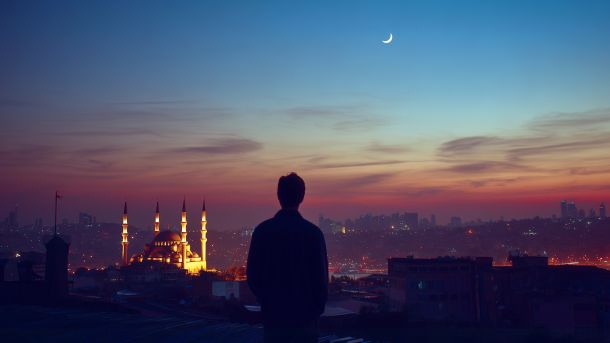God’s Voice Gift Which Has Suddenly Got Silenced
In This Article
-
Who was this Gülen that he should be at the base of the controversy in Turkey when humanity ceases to be a factor in the affairs of those in political power?
-
“If they were to pass a death sentence, I would go smiling to the noose, but I would never apologize to an oppressor, even if they killed me fifty times over.”
In November 2020, I had chance to interview a Turkish girl child hinged on the International Children’s Day. Ayşe (not her real name) lamented that her parents had since stopped taking her to Turkey, a country of “smiling landscapes and beautiful people.” She had a blurred vision of Erdoğan but was certain of one thing about Gülen. “We call him the crying grandpa,” she told me. Four years on, Ayşe is still living in forced exile in Tanzania because of inimical government relations back home against Gülen and all those who sympathize with his peace policies all over the world. As fate would have it, this was about one month to the 2024 International Children’s Day.
Come the day, I, again, through the parents, wanted to get Ayşe’s reaction to Gülen’s death. “Grandpa has passed away,” she “broke” or “shared” the sad news with me. There are lots of questions lying behind all this: What has been the real difference between Erdoğan, Gülen and their followers? If Erdoğan has all along scared his people and the world of “Gülenists,” could there be “Erdoğanists” for the Turks and the universe to be scared of as well? What does Gülen’s death mean on the ground to Turkey and the world? Who was this Gülen that the world should be moved about his death?
Now the African perspective.
Indigenous knowledge has it that “Enyama mbi tew’aluti ” – literally meaning “bad meat takes long to clear from the barbecue stick.” Why? Nobody rushes for it. Similarly, in the world of organized procedures, it is held: “It’s the exception that proves the rule.” Thus, in the practice of Mathematics: “Any number to power zero is equal to one, except zero itself.” In Chemistry, ions with the same charge repel. In music, non-rhyming sounds subject listeners to cacophony. A frontline rebellion in a battle is a war lost in the making. Examples are inexhaustible.
In Africa we also say: “Alikukumanya niwe akwita” – meaning “it is he who knows you who kills you.” In the biblical Paradise of Eden narrative, the target of the Snake must have been Adam. But to reach him, Eve was the most promising and appropriate tool. She knew him very well and he knew her well as well. When it came to a money trap module to betray Jesus, his disciple, Judas Iscariot, who was the treasurer, was the best choice. After being paid the fee, he assured them: “The one I kiss….”
In the most immediate Turkish history, circumstances crossed the paths of President-to-be Erdoğan and the Muslim cleric and scholar Fethullah Gülen on the promise of a more democratic country and freedoms based on universal standardsWhat could make them part ways unto the grave of one of them and even beyond? Why did Erdoğan go to the extent of demonizing the life ofGülen, when the whole world was mourning the death of a living saint rather than someone who had lived a “dishonorable life and like a demon in human form,” according to Erdoğan? Who was this Gülen that he should be at the base of the controversy in Turkey when humanity ceases to be a factor in the affairs of those in political power? Why should a political leader, and considered believer in one God, for that matter, be inhuman? He jails babies with their Gülen-linked mothers and conducts strip searches on the country’s daughters, mothers and grandmothers?
Here one has to go further, if not dig farther or both. A dip into the Turkish history reveals stories of scholars who stood firmly against oppression until Gülen appears on the stage. These noble individuals go beyond time, becoming travelers who foresee the future, much like Fethullah Gülen has. It’s as if Gülen stood on the watchtower of history, envisioning the future and leaving his notes. His vision heralded a renaissance after a period of darkness, testing both the loyalty of friends and the mercy of foes.
Imam Ahmad ibn Hanbal, a disciple of Imam al-Shafi’i, contributed a lot to the expansion of the territories where Muslims ruled. He was tortured and imprisoned for over two years for rejecting the idea, imposed by Abbasid caliphs al-Ma’mun, al-Mu’tasim, and al-Wathiq, that the Quran was created. He continued to pursue knowledge even in prison. Imam Abu Hanifa was imprisoned and tortured for refusing an offer to be a judge for the Abbasid caliph al-Mansur. Relentless pressure notwithstanding, he never bowed to the caliphates of the Umayyads or Abbasids. He died from poisoning. Imam al-Ghazali was also subjected to pressure from the authorities, who ordered his books burned. For criticizing a ruler of the Kara-Khanid dynasty, Imam Sarakhsi was thrown into a well in Özkent, from where he dictated his famous work, al-Mabsut. Ibn Taymiyyah was persecuted for his views, repeatedly imprisoned, and died in captivity, completely dispossessed.
In modern times, Fethullah Gülen walked this same path. After the July 15th 2016 “cooked coup,” which he condemned and denied any connection, he declared: “If they were to pass a death sentence, I would go smiling to the noose, but I would never apologize to an oppressor, even if they killed me fifty times over.” This statement underscores his resolve in pursuing truth and justice. Gülen’s words reflect the breadth and depth of his vision for humanity. In his work The Messenger of Humanity, he wrote: “Humanity can only draw closer through love, tolerance, and dialogue.”
Gülen consistently advocated for dialogue between the Abrahamic faiths and once brought together leaders of major religions around the same table in Istanbul. He believed that “those who are confident in their beliefs respect others’ faiths. One’s own values are best understood by recognizing others’. Everyone’s faith belongs to them, and no one can impose their beliefs on others.” Gülen reminded us of the shared values of humanity, saying: “Differences among people exist not to divide us but to complete each other.” This perspective is more essential today than ever.
The schools inspired by Gülen’s vision across the world embodied his dream that “Knowledge should flow from Turkey to the world.” These institutions have fostered bonds between diverse cultures and planted seeds of peace and fraternity. His legacy is not just in his written works or founded institutions, but in the indelible mark he left on the conscience of humanity—a bright path for generations to follow.
To come to grips with Gülen’s life, one has to read Said Nursi (1877-1960) a lot. Typical of his life of sincerity, Said Nursi, who is also known as Bediüzzaman – the miracle of time – examined the political life of his day, critically subjecting it to his moral weights and measures standards, leaving the rest of the world countries to find their individual morals index slots. Said Nursi, as a child, was conceived in the womb of the Ottoman Empire to which he was consequently born and on whose milk he subsequently breastfed. Only a few years senior to the founder of the Republic of Turkey, Mustafa Kemal Atatürk (1881-1938), he went through an experience that must have had a bearing on his way of life as a great thinker, author and what I can dare call “genuine Muslim.”
He was around when his age mate Mustafa got the Kemal nickname – meaning “the perfect one.” He saw Kemal and his supporters establish a new Turkish government and capital at Ankara. He witnessed the national assembly abolishing the Ottoman sultanate and Greek forces being driven out, opening doors to the Republic of Turkey to come into formal existence. He bore witness to Kemal assuming the presidency and turning tables on everything, including traditional Islamic religious schools and courts. The president grew more reserved, solitary and remote, moved into the Sultan’s Palace in body and spirit, leading a luxurious life until his death.
To this, Africa indigenous knowledge has many observations. Among them: “You can make a monkey put on a golden ring but that can’t kill its habit of stealing maize from people’s farms. You can boil water to any temperature, but it will never forget its origins (coldness). You can expose an elephant to urban life, but you cannot prevent it from littering streets”.
Gülen never met Said Nursi. He only met his disciples. He understood his mission and took it upon himself to put it into practice. And, like him, he did not harbor political ambitions. Dr. Jon Pahl summarizes the situation rightly in his book on Gülen and the life of Hizmet when he says: “… to focus on events in Turkey in recent years, and Fethullah Gülen’s role as cause, effect, villain, hero, winner or loser would be to reduce the meaning and significance of his life to something like wax; ephemeral relations with a paltry kind of power…”
Said Nursi had all along said it categorically that the real enemies of the Turkish (in fact any) people are none other than ignorance, poverty and disunity. Gülen took it upon himself that the solution revolved on the axis of molding a cohesive and disciplined community through education, mass media and financial networks targeting the establishment of a new power balance of justice, love, respect and equality among people. For which, an environment had to be built whereby one has to see all others as God sees them with the eyes of mercy and compassion. People must be revived; not killed. Today, however, about a quarter of the Turkish people have come to a stage where they wish it were possible for them to live somewhere else rather than under the Erdoğan regime.
Said Nursi warned: “Moral laws are absolute. They are not relative. Effort spent on spicing our actions in the interest of our desires points in the wrong direction. This is why we substitute legal and illegal, right and wrong with attributes. And a State is created along these lines.” In the Seedbed of the Light, Fourth Treatise, Third Part of the Spark, he said: “Happiness and real pleasure lies in forsaking everything, including existence for His (God’s) sake. A drop of water has the same nature as an ocean (both are water) and a river (both are from clouds).
“Whatever is suffered for God is good. It is sweet even if apparently bitter, for it makes you taste the pleasure of supplicating and praying to Him. Every speech unconcerned with Him is idle talk.” Giving us a sort of cardinal self-observation point, he said: “Human beings are usually susceptible to shedding positive knowledge as they go down the learning lane. Instead, we pick and treasure meaningless and sometimes wrong convictions, which eventually lead us astray.”
This was with Gülen until his last breath, enabling him to leave behind a legacy not of material wealth but many shelves filled with the books he authored. His simple lifestyle demonstrates the transitory nature of worldly riches, elevating the significance of spiritual values and the blossoming hopes. I have read his works and works about him by others and reviewed some of them. Following his passing, Tushar Gandhi, the grandson of Mahatma Gandhi, could not have put it better when he expressed his sorrow on social media, saying, “Another voice of peace has fallen silent. A great loss for humanity.”
All said, Gülen was more than the son of Turkey. He belonged to the whole world. From the African perspective, Gülen was “mithili ya zawadi ya sauti ya Mungu iliyozimika” – the symbol of God’s voice gift which has suddenly gone silent.









